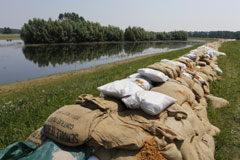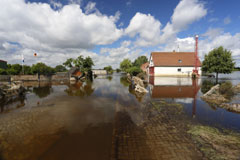Zurich research: ”After a flood is really just before the next flood”
Zurich Insurance Group (Zurich) announces the publication of two research papers on flood resilience as part of its global flood resilience program.
Two recently published research papers reveal the need for a radical rethinking on flood resilience. The first report, a collaboration with the Institute for Applied Systems Analysis (IIASA) and the Wharton School of the University of Pennsylvania shows how mass urbanization and climate change will worsen impact of floods. The second paper focuses on the Central European floods which occurred in June 2013 and were some of the worst in recent memory.
Zurich committed to the flood resilience program because floods affect more people globally than any other type of disaster and are responsible for some of the largest economic, social, humanitarian catastrophes and insured losses.

The joint report on “Enhancing community flood resilience: a way forward” funded by the Z Zurich Foundation, is part of a multi-year academic cooperation between Zurich, IIASA and the Wharton School. It reveals that in the past two decades, nearly 87 percent of aid funds were spent on emergency response, reconstruction and rehabilitation, and only 13 percent toward reducing and managing risks. For every USD 100 spent on development aid, just 40 cents has been invested in defending that aid from the impact of disaster.
“There is a need for a radical rethink on the approach to mitigating and preparing for floods, we need to focus more on pre-event mitigation, as opposed to focusing almost solely on recovery. Because we know that ‘after a flood’ is really just ‘before the next flood’ said Mike Kerner, CEO of General Insurance at Zurich Insurance Group. “The key to enhancing flood resilience lies in increasing our understanding of the full breadth and scale of the risks and how to best protect against them.”
The report proposes a new framework to measure the ability of communities to withstand floods and assess the best use of capital to improve resilience. The framework will help quantify the success of flood resilience efforts and demonstrate the benefits of pre-event risk reduction, as opposed to post-event disaster relief. Zurich is testing this framework by collecting data in countries prone to flooding including Indonesia, Mexico, Nepal, and Peru.
Successful measures


The second report, “Flood Resilience Review: Central European Floods 2013: a retrospective”, which was produced by Zurich looks in detail at the major floods in central Europe in 2013, particularly in Germany but also Austria and Switzerland, and the impact they had on communities compared to earlier flood events. It also highlights several successful measures to increase flood protection. In Germany, thanks to increasing the height of a dam and risk reduction measures along the Isar river, Munich and Landshut avoided serious flood damage. Additionally, park-like areas were created to give the Isar more space, reducing its destructive force. The introduction of ‘polders’, low-lying tracts of land set aside to retain water during floods, also proved effective where they could be created. In Austria, investing in mobile flood barriers showed that it offers advantages when done right. Over all, flood protection in Austria worked well, except for the small town of Melk, where work on the mobile dam had not been completed in time and the historic town center was flooded.
Zurich committed to a global flood resilience program in 2013, and is collaborating with institutions such as the International Federation of Red Cross and Red Crescent Society, the International Institute for Applied Systems Analysis (IIASA), Practical Action, and the Wharton Business School to bring an interdisciplinary approach to promoting community flood resilience.
“At Zurich, we seek to use our core skills and experience as an insurer to benefit society. These skills include our understanding of risks. We have a role to play in using these skills to help individuals, businesses, communities and economies better manage the devastating effects of floods,” added Mr. Kerner.
Further information
To get instant access to Zurich’s news releases, calendar and other corporate publications on your iPad, iPhone or Android phone please go to your App Store and get the free Zurich Investors and Media App.
Corporate responsibility is a key part of Zurich’s strategy and supports our mission to help our customers understand and protect themselves from risk. As part of our strategy, we are focusing on our strengths as a business, and on key enablers of success – actions we need to take to achieve our strategic objectives. We think about corporate responsibility in the same way, focusing on seven areas that either make use of our insurance, risk management and investment expertise, or are enablers of Zurich's success. They are:
- Enhancing community flood resilience (see more on Zurich’s global flood resilience program)
- Investing our Group assets responsibly (Zurich is a signatory of the Principles of Responsible Investment (PRI))
- Working with our corporate customers to help them understand and manage their corporate responsibility risks
- Community investment locally and through the Z Zurich Foundation
- Environmental performance, and health and safety management in our office buildings
- Diversity and inclusion in our workforce
- Responsible supply chain management
Zurich participates in the Dow Jones Sustainability Indices (DJSI) and FTSE4Good.
Zurich has been a signatory of the UN Global Compact since 2011 and we are committed to making the Global Compact and its principles part of Zurich’s strategy, culture and day-to-day operations
Downloads
Zurich Insurance Group (Zurich) is a leading multi-line insurer that serves its customers in global and local markets. With more than 55,000 employees, it provides a wide range of general insurance and life insurance products and services. Zurich’s customers include individuals, small businesses, and mid-sized and large companies, including multinational corporations, in more than 170 countries. The Group is headquartered in Zurich, Switzerland, where it was founded in 1872. The holding company, Zurich Insurance Group Ltd (ZURN), is listed on the SIX Swiss Exchange and has a level I American Depositary Receipt (ZURVY) program, which is traded over-the-counter on OTCQX. Further information about Zurich is available at www.zurich.com.
